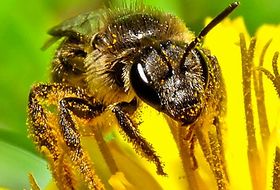
VALENCIA. The European Commission has banned for two years three pesticides, which were potentially harmful for honeybee populations, thanks to the support of 15 of the 27 members of the Union (including Spain). Ecologists and beekeepers, who have been crying for help for years, scored a point against multinational companies that sell this kind of pesticides, like Bayern or Syngenta.
The restriction of these chemicals, belonging to the family of neonicotinoids (imidacloprid, clothiandin and tiametoxan), was to be executed in July, but has been postponed until December 1. The European Commission has claimed «legal reasons» for doing so, because «most farmers had already bought or ordered seeds for the summer».
Brussels took the controversial vote as a response to the study carried out by EFSA (European Food Safety Authority) and published last 16th of January. The report concluded that the substances used (neonicotinoids) to prevent pests in crops like sunflower, corn, cotton or rape, were affecting the bees' central nervous system and are a great deal responsible for Colony Collapse Disorder (CCD).
This syndrome causes disorientation in bees, which most times lead them to death. It can even worsen physiological and neurological deficiencies. For instance, «it causes communication and coordination problems in foraging bees, which stop working at the beehive, or fertility problems in queen bees. These lacks in a social animal, such as bees are, are something big», explained Enric Simó, beekeeper from APIADS (Beekeeping Health Protection Association).
In fact, last February, Greenpeace and Ecologistas en Acción (Eglogists in Action) activists, as well as the COAG (Association of Farmers and Stockbreeders) coordinator, demanded the European Commission to withdraw neonicotinoid pesticides from the market.
They claimed that honeybees disappearing was damaging the economy since «84% of food production depends on bee pollination». According to the COAG warnings published in Cinco Días, pollination amounts to approximately 165,000 million € worldwide per year, and approximately 22,000 million € in Europe. But this is not only a monetary matter. As Enric Simó warned, «the whole ecosystem is at stake. Biodiversity will be unbalanced if bee colonies keep on disappearing».
Less honeybees in Valencia
Precisely APIADS has been following the effects of CCD for more than ten years in the region of Valencia, where there are more than 400,000 beehives and almost 1,900 beekeepers. They have and agreement with the University of Valencia's School of Pharmacy, where they analyse bees and plant material in crops where animal intoxication has been reported.
«The data show that bee mortality rates, which normally should be around 15%, has reached 40% or even 50% in recent years due to these pesticides. We have detected enough doses to kill insects in plants », explains. In the region of Valencia, where citrus crop production is very common, the roots of the problem can be found in «labourers who spray orange and lemon trees during the flowering season. Bees are highly attracted to flowers and eat poisoned food that subtly kills them», regrets.
Full text available at Mètode's website.
Noticias relacionadas
 AVISO DE COOKIES: Este sitio web hace uso de cookies con la finalidad de recopilar datos estadísticos anónimos de uso de la web, así como la mejora del funcionamiento y personalización de la experiencia de navegación del usuario. Aceptar
Más información
AVISO DE COOKIES: Este sitio web hace uso de cookies con la finalidad de recopilar datos estadísticos anónimos de uso de la web, así como la mejora del funcionamiento y personalización de la experiencia de navegación del usuario. Aceptar
Más información


 imprimir
imprimir meneame
meneame
 whatsapp
whatsapp